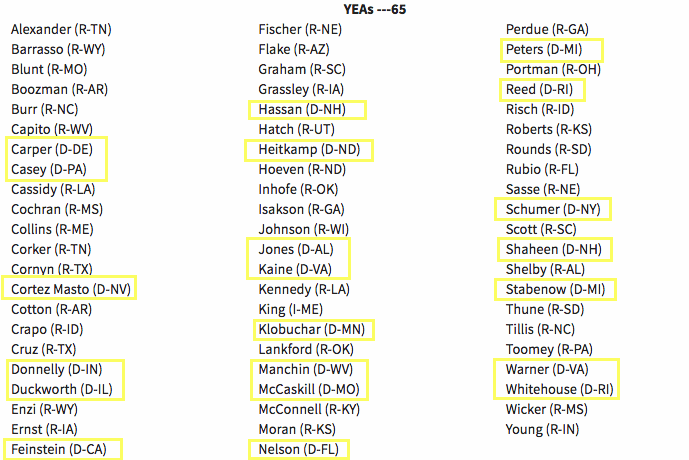Senate Passes FISA Reauthorization Act, With Help of Democrats
The Foreign Intelligence Surveillance Act (FISA) Amendments Reauthorization Act would consolidate the FBI’s power to search Americans’ digital communications without a warrant. Screen shot via CSPAN
Screen shot via CSPAN
With the help of 21 Democrats, the U.S. Senate passed the Foreign Intelligence Surveillance Act (FISA) Amendments Reauthorization Act of 2017 on Thursday, a bill that critics argue expands the government’s ability to spy on digital communications without a warrant.
The legislation, which passed the House last week, focuses specifically on Section 702 of the Foreign Intelligence Surveillance Act, which was initially passed as part of the FISA Amendments Act in 2008. The Electronic Frontier Foundation (EFF) explains:
Section 702 is supposed to do exactly what its name promises: collection of foreign intelligence from non-Americans located outside the United States. As the law is written, the intelligence community cannot use Section 702 programs to target Americans, who are protected by the Fourth Amendment’s prohibition on unreasonable searches and seizures. But the law gives the intelligence community space to target foreign intelligence in ways that inherently and intentionally sweep in Americans’ communications.
The EFF expanded upon FISA’s infringement on the 14th Amendment in a series of tweets Thursday, shortly after the Senate vote. Read the full thread here.
Today’s Senate vote is notable for the number of Democrats who supported the bill:

Numerous Democrats also helped shut down debate on the legislation earlier this week, ensuring it would come a vote. California Sen. Dianne Feinstein, an early advocate of reforming the FISA reauthorization, switched sides during the debate and voted in favor of ending the debate to modify the bill.
President Trump is expected to sign the bill, although he initially confused lawmakers last week by tweeting about the “controversial” legislation. He has yet to comment on Thursday’s Senate vote.
This split in the Democratic Party may be an ominous signal of what’s to come in the November midterm elections, as progressive members of the party did not mince words when voicing their strong opposition to the bill:
The US should not be in the business of warrantless, dragnet surveillance of American citizens. But Section 702 of FISA allows our gov’t to do just that. I voted no on a bill to reauthorize Section 702 without important protections for Ameicans’ privacy. https://t.co/zI2Z4vmUXW
— Elizabeth Warren (@SenWarren) January 17, 2018
Rubber-stamping this awful #FISA #Section702 bill is a dereliction of of the oversight duty of Congress. pic.twitter.com/q0ROt518h4
— Ron Wyden (@RonWyden) January 18, 2018
Numerous advocacy groups also expressed outrage in response to the Senate vote.
“Congress abdicated its responsibility to ensure that our intelligence agencies respect the Fourth Amendment,” Neema Singh Guliani, legislative counsel for the American Civil Liberties Union, said Thursday. “Instead of instituting much needed reforms, lawmakers voted to give the Trump administration broad powers to spy on Americans and foreigners at home and abroad without a warrant. No president should have this power, much less one who has endorsed policies designed to unfairly target critics, immigrants, and minority communities.”
“Nevertheless, the fight over this authority is far from over,” Singh continues. “The ACLU is currently challenging warrantless surveillance under Section 702 and will continue to fight this unlawful surveillance in the courts. We will use every tool at our disposal to stop the continued abuse of these spying powers.”
Your support matters…Independent journalism is under threat and overshadowed by heavily funded mainstream media.
You can help level the playing field. Become a member.
Your tax-deductible contribution keeps us digging beneath the headlines to give you thought-provoking, investigative reporting and analysis that unearths what's really happening- without compromise.
Give today to support our courageous, independent journalists.






You need to be a supporter to comment.
There are currently no responses to this article.
Be the first to respond.